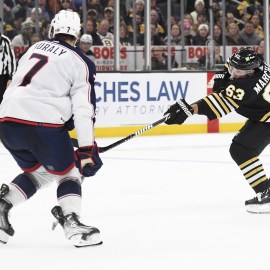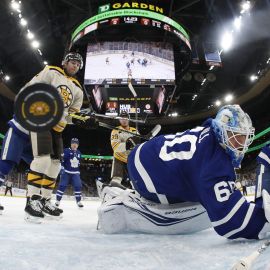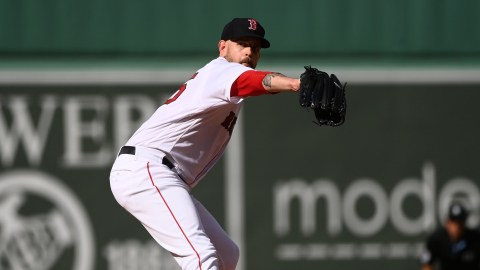It’s pretty remarkable, all things considered, that the Bruins have consistently had their way with the Maple Leafs in the Stanley Cup playoffs.
The two teams will renew their rivalry once again when they open a first-round series Saturday in Boston. Once more, Toronto will look to exorcise its demons, hoping this will be the first time since 1959 that it can beat the Black and Gold in a postseason series.
The Bruins’ 65-year postseason winning streak over its Original Six rival spans over six series. The B’s are just one of four teams in NHL history to win six straight playoff series against one team.
But it’s not like Toronto hasn’t pushed Boston to the brink. The two teams have met three times since 2013, going the seven-game distance each time. The Maple Leafs have put forth tremendously talented clubs over the last decade, and when you have three Game 7s go the way of one team, you do wonder whether their opponents are due.
Story continues below advertisement
Perhaps this year is finally that year for Toronto. The Leafs are led by the NHL’s best goal-scorer, Auston Matthews, who potted 69 this season, and Toronto was aggressive at the NHL trade deadline in an attempt to beef up for a deep playoff run.
However …
The Bruins have plenty of reason to feel confident in their ability to send the Leafs packing once again, and those reasons extend beyond just the friendly, familiar feeling of dispatching a hated rival over and over again. Or the fact that they swept the four-game season series, too.
Here’s where the Bruins have an advantage entering their first-round series with Toronto.
Story continues below advertisement
Goaltending
Four goalies could and probably will see the ice in this series. Objectively, the two best of that group belong to the Bruins: Linus Ullmark and Jeremy Swayman. Both of them rank in the top 10 of all NHL goalies in goals saved above expected with at least 20 games played this season, and Swayman especially was arguably a top-five goaltender the entire season. The Bruins have been coy about their goaltending plans, but they should feel confident with whoever is between the pipes. The same can’t be said for Toronto, as it’s the same old story in that regard. Ilya Samsonov is Toronto’s most established netminder, and he did get the bulk of the work in the regular season. He was as leaky as it gets down the stretch, though, allowing at least four goals in three of his final five starts, including 11 goals on just 52 shots in his final two starts. Samsonov is streaky. Poor performance earlier in the season even earned him a trip to the AHL. Joseph Woll, meanwhile, was sensational in the first half of the season. The Boston College product posted a .916 save percentage through Nov. 28, a number that dipped to .897 in the 13 games that followed. Woll has just two career playoff starts under his belt, too. Both Toronto goalies are capable of standing on their heads, stealing a game and potentially the series, but that tandem lacks the baseline consistency the Ullmark-Swayman duo brings to the table.
More Bruins
Team defense
Team defense and goaltending are intertwined. Ullmark and Swayman benefit from what’s in front of them. The Bruins’ defensive system under Jim Montgomery isn’t as stout as it was under Claude Julien or Bruce Cassidy, and losing the likes of Zdeno Chara and Patrice Bergeron in recent years doesn’t help, either. That being said, a team built by Don Sweeney is going to be defensively responsible. There’s a far greater emphasis on defensive responsibility across the roster with how the Bruins were built as opposed to Toronto. The Maple Leafs have unmatched firepower up front, but there are questions about how those superstar goal-scorers can play in their own end. General manager Brad Treliving made defense a priority at the deadline, but the Maple Leafs are still vulnerable on the back end. From the department of “no duh,” if the Bruins can make Toronto play in its own zone consistently, they will win the series. Doing so not only puts the Leafs in a position where they have to defend their own net — a weakness — but it also strips them of their biggest strength, which is playing downhill in the offensive end.
Offensive net-front presence, ability
Once again, maybe a little overlap here, as the Bruins’ ability to generate offense in front of the Toronto net will be somewhat dictated by, well, the Leafs’ ability (or inability) to defend its cage. Again, Treliving, a 6-foot-4 former defenseman himself, spent his deadline shopping for size and experience on the blue line. He came home with Ilya Lyubushkin (6-foot-2) and Joel Edmundson (6-foot-5) while also acquiring the rights to former Boston University D-man Cade Webber. The Leafs just signed the 6-foot-7 Webber to an entry-level deal, and he’s traveling with the team, so he could maybe make his debut if needed. The Bruins, however, have the sort of forward size that should ensure they aren’t easily pushed around. With Pat Maroon in the fold, the Bruins now have six forwards who stand 6-foot-3 or taller, and all of them are more than comfortable going to the dirty areas.
“You’re just going to have to win that battle,” Bruins general manager Don Sweeney said Thursday when talking about his team’s ability to win the net-front war. “That ice has to be yours. I don’t think that’s ever changed. It still comes down to one-on-one battles and confrontational hockey. In the playoffs, you realize that — in the first round in particular — physicality probably triples. Ice is earned, interior ice is earned because it’s valued.”
Story continues below advertisement
The Bruins, a team built by Sweeney and Cam Neely, certainly have that ability and mindset. If they can impose it on Toronto in the first round, their decades-long winning streak should be extended.
Featured image via Dan Hamilton/USA TODAY Sports Images


















